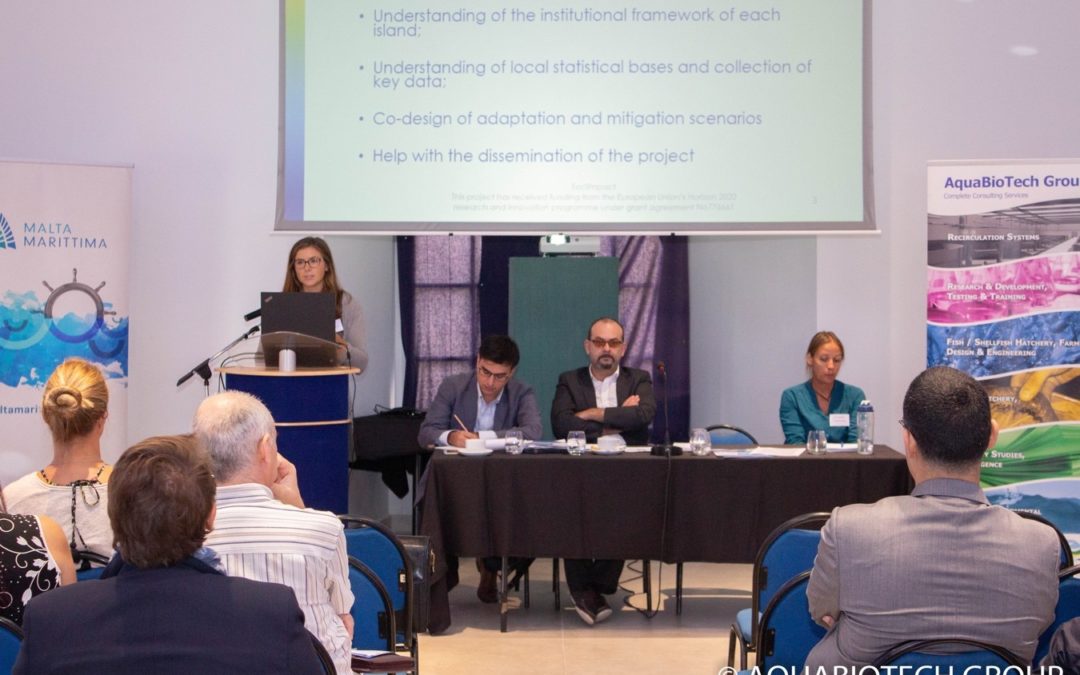Last Thursday, 20th September SOCLIMPACT project celebrated its sixth local working group in Malta. Essential Blue Economy sectors analyzed the main issues of Climate Change: The priority hazards and impacts, the data source available, the experience regarding Climate Change and the cases study that every sector would like to add in SOCLIMPAC project.
The SOCLIMPACT partner introduced the official opening welcome, AquaBiotech group and Malta Marittima introduced the event. This last one highlighted the importance of scientific researches related to Blue Growth, the responsible use of seas, and the cooperation between sectors, decision-makers and public entities.
Kyra Hoevenaars, a partner of SOCLIMPACT Project, provided a brief introduction on the aim of the project, its objectives and the Blue Economy sectors. The presentation also indicated the climate change assessment framework, the complex impact chains and how Climate Change may affect Malta.
After this introduction, the stakeholders did a presentation of themselves and the organization they work. They also made suggestions about how they are addressing the Climate Change issues, what provide and how they can use the SOCLIMPACT project.
To get a picture of the state in the different sectors in Malta, especially related to Climate Change, the participants discussed the institutional framework for climate policies.
All these reflections promote another discussion about the progression of adaptation pathways in the island. In this regard, the University of Malta is working in several projects: FLASC its about developing a hydro-pneumatic energy storage system that integrates into an offshore floating platform. SOLAQUA address the issue of scarcity of land in small countries like Malta or large coastal cities where it is difficult to find adequate areas to build large solar farms.
On the other hand, there are other initiatives to encourage innovation in the maritime sector funded by EcoMarine.
The event continued with a roundtable per sector focus on the priority hazards and impacts; the changes experienced motivated by Climate Change and cases study of the island that SOCLIMPACT project can study.
In AQUACULTURE, the priority hazards and impacts detected for the sector were:
– Increase (water & air) temperature
– Increase intensity and frequency of extreme weather events:
– Change of currents and waves
– Seal level rise
In MARITIME TRANSPORT the priority hazards and impacts detected for the sector were:
– Sea level rise
– Wind
-Wave action
– Lighting and storms
– Heatwaves
– Greenhouse gases (GHG´s)
Finally, the stakeholders proposed to include Freeport as a case study in the SOCLIMPACT project, since it is important for Maritime Transport sector, is economically essential for Malta and in the region, and offers the possibility to include investigation of community adaptation strategy on various levels (e.g. port personnel, fishermen community in Marsaxlokk, Malta Fish Farming Ltd, etc.). For instance, the potential investigation could include on familial livelihoods, tourism aspects, local fish production and biodiversity.
In ENERGY, the priority hazards and impacts detected for the sector were:
– Temperature rise and interannual variability of temperature
– The concentration of CO2
– Increased frequency and intensity of extreme climate events
The cases study proposed for stakeholders in this sector were FLASC as a renewable energy storing project (Prototype of stored energy in compressed water) and SolAqua: Floating solar panels projects.
In TOURISM, the priority hazards and Impacts detected for the sector were:
– Shift in seasons because the summer will be hot for tourist
– Better weather conditions for jellyfish and algae
– Increase in water level
Among the cases study, stakeholders provided particular scenarios as the effects of the beach expansion, and how will it impact the wild lift in Ghadira and the situation of Comino, an area already polluted with increasing visits.
The meeting closed with a commitment from the stakeholders to provide data available useful for the project and to use it as a tool for countering the effects of climate change in the region.

